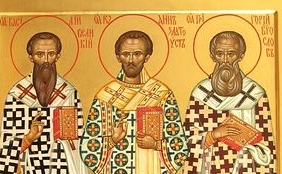Sermon for the Three Hierarchs
 In the Name of the Father and of the Son and of the Holy Spirit. Amen. Today, we celebrate the Feast of the Great Patrons of all Seminarians throughout the world: St. Basil the Great, St. John Chrysostom, and St. Gregory the Theologian. These three Saints not only had a profound knowledge of the deep mysteries of God but also were granted tremendous ability to elucidate these mysteries to us with utmost clarity, teaching us by their words and their deeds. All three of these Saints had an amazing grasp of the things of heaven and also of the created world, using philosophy, science and other fields of secular learning to build up the Church and eloquently convey the Truth, thereby showing us that a balanced well-rounded education is not to be disdained but rather is to be used for the glorification of God, the spreading of the Gospel, and is to be sanctified by Christ through prayer, ascesis, humility and submission to the Church and to God-ordained authority.
In the Name of the Father and of the Son and of the Holy Spirit. Amen. Today, we celebrate the Feast of the Great Patrons of all Seminarians throughout the world: St. Basil the Great, St. John Chrysostom, and St. Gregory the Theologian. These three Saints not only had a profound knowledge of the deep mysteries of God but also were granted tremendous ability to elucidate these mysteries to us with utmost clarity, teaching us by their words and their deeds. All three of these Saints had an amazing grasp of the things of heaven and also of the created world, using philosophy, science and other fields of secular learning to build up the Church and eloquently convey the Truth, thereby showing us that a balanced well-rounded education is not to be disdained but rather is to be used for the glorification of God, the spreading of the Gospel, and is to be sanctified by Christ through prayer, ascesis, humility and submission to the Church and to God-ordained authority.
“By keeping the feast of the Three Hierarchs at the end of January, the month in which we keep the memory of so many glorious Bishops, confessors
The great
These Saints also offer us today the great gift of humility. By seeing their lives and the mercy that they were granted by God, we can begin to fathom the unthinkably great height they ascended and luminous Glory that God gives to His chosen ones. Reaching a profound state of holiness by participating in the life of God Himself, these luminaries were not simply “good people” but rather they were Angels in the flesh, heavenly men who through Christ transcended the laws of nature, sin, and death. St. John Maximovitch tells us the holiness that these great Saints possessed “is not simply righteousness, for which the righteous are accounted worthy to enjoy blessedness in the Kingdom of God, but is rather such a height of righteousness that the Saints are SO filled with the grace of God that it flows from them and out upon those who are in fellowship with them. Great is their blessedness, (he says) which proceeds from the vision of the Glory of God. Filled to overflowing also with a love for men which proceeds from love for God, they are responsive to the needs of men and to their supplications, and become mediators and intercessors for them before God.2”
These giants of the spiritual life entered into the innermost Holy of Holies in the Heavenly Tabernacle even while they were yet in the body and now they abide there forever, in the closest proximity possible to the Throne of the Triune God, interceding for us. We see this truth illustrated in the iconographic scheme here in the Church, which is an image or reflection of the Heavenly Church. We can see that not all of the Saints are in the Altar, some are in the Narthex and some in the Nave. And yet, the ones who always stand closest to the Throne (in the Altar), with the exception of the Mother of God and St. John the Baptist, are the Three Great Hierarchs, whose icons can be seen when the curtain is opened.
These saints, and indeed all the Saints, grant us the gift of blessed humility because when we see their lives, we can begin to realize our own poverty and how far away we really are from the goal that God has for all of us, soberly reminding us that anyone could fall away from God at any time. And yet, it is this very humility alone of which we speak which actually attracts God's protecting grace, preserving us from future deadly falls and which grants us salvation. Abba Dorotheos tells us that “even if we cannot endure much labor [like the great Saints] because we are weak, [we must]...be set on humbling ourselves. I firmly believe [he says] that, in the mercy of God, the little things done with humility will enable us to be found there, in the same place as the Saints who have labored much and been true servants of God.3”
The lives of the Saints should
“The Three Hierarchs, an earthly Trinity, have taught us in their writings and through their lives to worship and glorify the only True God: the Holy Trinity, Father, Son
Archimandrite Sergius (Bowyer)






